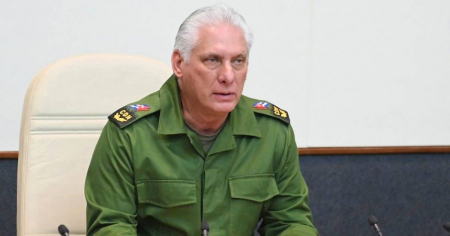The farewell to the old year in Cuba is marked by the words that encapsulate the cycle from the leader Miguel Díaz-Canel, an action that, for many, has already become a predictable ritual.
Since assuming the presidency of the country in 2018, the leader has taken every end of the year as an opportunity to speak words of encouragement and hope to the Cuban people, promising significant improvements in the future.
However, these words, filled with optimism, often clash with a reality characterized by economic crisis, shortages, and mass emigration.
A summary of the leader's remarks indicates that in 2020 he stated that this must be the year "in which we finish removing or proposing everything that needs to be proposed to unlock the economy, to truly unleash productive forces."
In 2021, Díaz-Canel described it as a year of "losses and tough lessons, but also of victories." He urged citizens to embrace 2022 with "optimism and joy," emphasizing the need to work together to build a better future.
This message generated outrage among many Cubans, who felt it did not reflect the reality of scarcity and repression they were experiencing.
In his end-of-year speech for the following term, the leader described 2022 as one of the "most challenging" years in the country's history and warned that 2023 could be even more difficult. Nevertheless, he urged the Cuban people to face the challenges with passion and determination, reiterating the importance of unity and creative resilience.
By the end of that year, things were no different. Díaz-Canel urged Cubans to "enter 2024 with all passion and joy," blaming the U.S. embargo for current difficulties and reiterating optimistic slogans similar to those of previous years.
However, the everyday reality of the citizens, marked by scarcity and economic crisis, sharply contrasted with their message.
His words have not changed throughout 2024. This year, the leader acknowledged on several occasions the harshness of the year, stating that "we are practically living day by day" and calling for "creative resilience" as a solution to the problems, without offering specific measures to address the structural difficulties of the Cuban economy.
In December 2024, during the closing of the National Assembly of People's Power, Díaz-Canel stated that Cubans are heroes who are "fighting without crying," deflecting his government's responsibility in the crisis and disregarding the plight of the people.
Hours before the year came to an end, the ruler shared a message of congratulations using his usual "revolutionary" rhetoric, which is disconnected from the sad reality of the Cuban people.
On social media platform X, Díaz-Canel referred to the people as "compatriots," congratulated them for their supposed "heroism," and claimed that they "overcame" in 2024, a year characterized by disastrous economic indicators that reflect the worsening crisis suffocating Cuba and its citizens.
The disconnect between Díaz-Canel's speeches and the reality faced by Cubans has also fostered increasing social frustration. What seems clear is that, as long as there are no profound transformations in the island's economy and politics, the president's words will continue to be seen as part of a cycle of expectations that fails to materialize into real prosperity for the people.
Frequently Asked Questions about Díaz-Canel's New Year's Address and the Crisis in Cuba
What message does Díaz-Canel convey in his end-of-year speeches?
Díaz-Canel conveys a message of optimism and promises for improvement in the future, despite the country's reality being shaped by a profound economic and social crisis. His speeches often emphasize "creative resistance" and the challenges posed by the U.S. embargo as justifications for the current situation, without providing concrete solutions to structural issues.
What is the "creative resistance" proposed by Díaz-Canel?
"Creative resistance" is a strategy promoted by Díaz-Canel to tackle the crisis in Cuba, based on rebellion, resilience, and innovation. However, it has faced criticism for lacking practical and effective measures to address the country's structural issues, and many view it as an empty rhetoric in light of the seriousness of the situation.
How has the Cuban population responded to Díaz-Canel's promises?
The Cuban population has shown increasing skepticism and frustration towards Díaz-Canel's promises. Many citizens feel that the discourse is disconnected from reality and lacks a clear action plan, which has led to protests and criticism, particularly on social media, due to the lack of tangible changes in their daily lives.
What are the main obstacles that Cuba faces in overcoming its economic crisis?
Among the main obstacles Cuba faces in overcoming its economic crisis are food, medicine, and fuel shortages, currency devaluation, and rampant inflation. Moreover, the lack of effective structural reforms, bureaucracy, and an inefficient system further complicate the situation, hindering significant progress in the economy and the production of essential goods.
Filed under:
